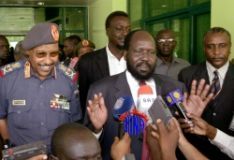Sudan’s Kiir briefed by Defense minister on security situation in Darfur
January 17, 2009 (KHARTOUM) — The First Vice-President of the Republic, Salva Kiir Mayadrit, visited the headquarters of the Sudanese army in Khartoum where he was briefed about the security situation in the country and Darfur particularly.

The Sudanese Defense minister, Abdel-Rahim Mohamed Hussein, briefed Salva Kiir who is the commander in chief of the Southern Sudanese army (SPLA), about the security measures undertaken by the SAF to secure the country. The briefing was also attended by the General Staff in the Sudanese Ministry of Defence.
Kiir during the visit stressed the need for joint action for the sake of unity and the extension of the peace, the official SUNA news agency reported today.
The First Vice-President also stressed the need to accelerate the training of the Joint Integrated Units (JIUs) of the SAF and SPLA to work as a team to support the peace and maintaining the unity of the country
The JIUs were envisaged to help build trust between the northern army, the Sudanese Armed Forces (SAF), and the former southern rebel Sudan People’s Liberation Army (SPLA), who fought a bitter civil war for more than two decades.
While soldiers from both armies have been designated for the JIUs, in reality none of the units are living or training in the same barracks and the troops still wear different uniforms. However after clashes in Abyei last May, the two parties formed JIUs in Abyei with the support of UNMIS peacekeepers.
In another sign of cooperation, Salva Kiir had ordered the SPLA units in Khartoum to take part in the battle against a raid by the rebel JEM on the capital on May 10.
(ST)

tayeb M. Alhassan
Sudan’s Kiir briefed by Defense minister on security situation in Darfur
This type of combined efforts helps inter-discussion of mistrust and leads to further coordination towards building much stronger nations ready for future challenges. We hope other SPLM/A leaders also take counterpart steps for more efforts coordination in other civil sectors.